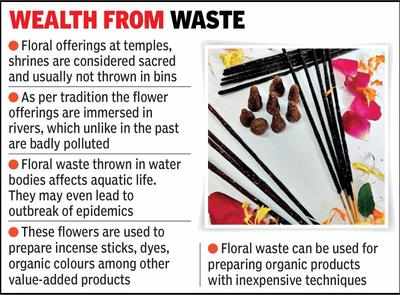
Vadodara: Everyday tonnes of flowers choke water bodies across the country. After they get wilted, the flowers that form sacred offerings at temples and shrines are not discarded in trash bins.
Instead, they are usually flung into local water bodies or rivers leading to pollution and irreversible damage to the environment.
Students of MS University have now found a practical solution to this problem by converting the spent floral wastes into organic products using simple and inexpensive technologies.
Three MSc final year students of MSU’s botany department — Himanshi Ramaiya, Shivani Bhatt and Anjali — have taken up a startup project of managing the temple floral waste which is recycled into organic colours, incense sticks and organic compost.
Under Gujarat government’s students’ startup and innovation policy (SSIP), the floral waste from temples in and around Vadodara is collected, dried and later used in powdered form to make value-added products.
“After a survey of temples in the city, we started collecting floral wastes directly from the temples. We collected the floral wastes from Ayyappa temple, Sama, Suryeshwar Mahadev temple at Manjalpur and a couple of other temples in the city area. The value-added products have been branded as ‘Phoolansh’,” said Ramaiya.
“It not only helps in saving water bodies near the temples from getting contaminated but also adds up to the spiritual value of our products. The products made would be sold to devotees and also the general public. The methodology of processing will also be transferred to those interested,” said Dr Amee Taunk, who has co-mentored the project along with Dr Bhavna Sharma under the mentorship of professor Susy Albert.
The project has received a Rs 40,000 grant under the SSIP. Apart from the usual marigolds, roses and seasonal flowers, even ‘billi’ leaves that are offered to Lord Shiva and ‘tulsi’ leaves that accompany most of the ‘prasad’ and floral offerings, are used for making compost.
“Flowers collected from temples are brought to a laboratory where they are dried. Later, they are sieved and the finer powder is used for making incense sticks. The remaining coarse particles are used for preparing compost,” said Taunk.
“Similarly, after extracting colours, which are used to produce dyes, from wet and dry flower waste, the remaining petals and other material is used for preparing compost,” she said, that the compost prepared acts as a good fertilizer.
FacebookTwitterLinkedinEMail
Credit: Source link





















